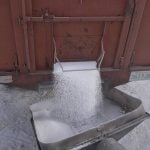By Phil Franz-Warkentin, MarketsFarm
WINNIPEG, July 28 (MarketsFarm) – The ICE Futures canola market was weaker on Tuesday, backing away from the six-month highs hit the previous session.
Improving soybean crop condition ratings from the United States Department of Agriculture sparked a selloff in that market, which accounted for much of the spillover weakness in canola.
Relatively favourable Canadian crop weather added to the softer tone, although enough areas of concern remain to keep some weather premiums in the market.
About 14,638 canola contracts traded on Tuesday, which compares with Monday when 21,932 contracts changed hands. Spreading accounted for 5,670 of the contracts traded.
Read Also
North American grain/oilseed review: Canola corrects lower
Glacier FarmMedia — ICE canola futures were weaker on Tuesday, taking back most of Monday’s gains as chart-based selling weighed…
SOYBEAN futures at the Chicago Board of Trade posted large losses on Tuesday, as better-than-expected weekly crop condition ratings weighed on the market.
The United States soybean crop was rated 72 per cent good to excellent in the latest weekly U.S. Department of Agriculture report, which was up three points from the previous week. Pod setting was pegged at 43 per cent, above the five-year average of 36 per cent.
A lack of fresh export sales, after 10-straight days of flash business, also put some pressure on values.
CORN futures posted small losses, lagging soybeans to the downside.
The corn good-to-excellent rating also improved three points on the week, hitting 72 per cent.
Relatively favourable Midwestern weather and declining Chinese corn prices also weighed on values.
WHEAT futures were down seeing some follow-through selling after yesterday’s declines.
The U.S. winter wheat harvest was 81 per cent complete in the latest report, up seven points from the previous week. The spring wheat harvest is just getting started, at one percent done.
Condition ratings for spring wheat were up two points on the week, to 70 per cent good-to-excellent.
Solid global demand and declining production prospects elsewhere in the world were somewhat supportive.










